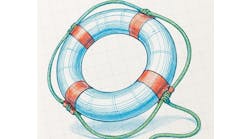How do we nurture experienced, talented leaders in an evolving process control industry?
Even in the 1990s, my refinery instrumentation group couldn’t attract process-savvy chemical engineers to fill all the spots. We had good people, but it was easy to be content just knocking out projects versus solving vexing control issues, like Cullen’s example of real-world valve response. In executing projects, sometimes engineers can just robotically follow specifications and replicate past practices. But in Cullen’s day, you might say we had a passion for not only doing things as well as we did last time, but also pushing the envelope, doing some things better than we ever had before.
Fifteen years earlier, circa 1980, my company was trying to be like Exxon. Even after “windfall profits” taxes on Prudhoe Bay crude oil, Standard Oil was flush with cash and working hard to figure out what to do with it. Building a formidable corporate engineering group was one of the ways we were inspired by Exxon, and I joined a control systems group of more than 25 chemical engineers devoted to furthering Sohio’s utilization of instrumentation and control technology. Like most of our industry peers, we had layers of expertise with 10, 15 and 20 or more years of experience, and a few individuals with sage-like status. Everywhere, there was a lot of experience and a lot of mentoring going on.
[pullquote]It wasn’t many years later that investors became weary of traditional industry, and energy sector boards decided cost reduction through staff cuts was a way to woo them back. Since Wall Street considered (arguably correctly) that Exxon was the epitome of a well managed energy and petrochemical company, we were all compelled to follow suit. Corporate engineering and R&D were slashed to the point where they were no longer capable of providing a meaningful or reliable service—there simply weren’t enough of them.
In the ensuing 30 years, there hasn’t been a lot of “windfall profits” outside of dot com startups, and hiring new control systems engineers who could be mentored and developed before the experienced people move on or retire has been challenging, to say the least. There’s an overall dearth of STEM-capable millennials that even want to work in a “smokestack and flare” industry. So, the days of training process-aware individuals to become controls professionals may be behind us. Sadly, I doubt that many of the Greg McMillans in our industry will be replaced in-kind. So who will be the Greg McMillan of 2050? God willing, he will still be with us.
That Cullen Langford and his peers could retire as “senior consultants” reflects a time when I&C-focused experts were highly valued and compensated by process industries. It’s becoming the norm in my neck of the woods to fill I&C vacancies with technologists with no process engineering or operating experience. I think this works as long as we’re content to follow specifications and just do what we always did. But if we wish to embark on new frontiers, like those being pursued by present-day ExxonMobil, one wonders if end users’ staff will have the experience, confidence and conviction to stake their careers (and persuade operating organizations) to embark on such an innovative new direction.
The new ExxonMobil/Lockheed Martin project proposes a new generation of open and standardized systems and software. It’s easy to imagine this will dilute the accountability of individual suppliers for the performance and efficacy of the overall control system, unlike today’s “one throat to choke” paradigm. And like making the jump to fieldbus, many organizations may lack leaders with the experience and organizational stature to persuade operations to deviate from what we’ve been doing for the past 35 years.
Unlike 1980, wishing to be a close follower of ExxonMobil may not give everyone the courage and will to actually go there. In parallel with the technological evolution being cultivated by the Exxon/Lockheed project, organizations need to be nurturing the next generation of users—engineers, operators, and technicians—to have the leadership, vision, and desire to embrace it.
[sidebar id =2]






